PURPOSE Sport pedagogy (SP) has established itself as a subdiscipline in Human Movement Studies since the 1970s. It has become an academic labyrinth as a result of its rapid flourishing. Most researchers are extremely confused about this disorderly research complex. This study aimed to evaluate the characteristics of SP in stages in the western (mostly English speaking) countries. METHODS Analysis of literature published in English from 1990 to 2022. RESULTS The developmental versions were divided as follows: SP1.0 is positivistic in nature, SP2.0 is multi-paradigmatic as it includes all paradigms, and SP3.0 (current version). Many academic journals have been launched, and a variety of books on divergent topics are being published. Currently, research has exploded. In SP3.0, research performed by British scholars are notable in terms of number and quality, overpowering those by scholars in the USA and other countries. Youth sport and sport coaching are regarded as new legitimate areas. Additionally, signs for SP4.0 have been indicated. CONCLUSIONS In order to find way outs in the SP labyrinth, it is necessary to recognize the current research trends in international SP.
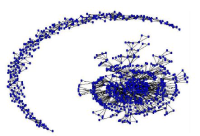
The purpose of this study was to identify the structure of knowledge in Sport Pedagogy field. Using bibliometric and social network analysis this study analyzed the keywords and citations appeared in Korean Journal of Sport Pedagogy and Korean Journal of Sport Science during 2006-2015 period. Total of 341 research papers which include 1301 keywords and 14826 citation were analyzed utilizing social network analysis as well as keywords frequency analysis, keyword co-occurrence, citation and co-ictation analysis. Results of this study showed that teaching, curriculum, and teacher education were three central theme in Sport pedagogy field. Key words such as physical activity, PE teacher, action research, and after school sport club activity were prominent research interests for scholard in the field. Quadradic Assignment Procedure analysis showed major research interests has not been changed between two periods of 2006-2010 and 2011-2015. Choi(2010)'s and You(2007)' books were most cited individual work and have influenced sport pedagogy researchers over the five years.

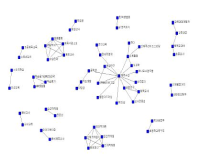

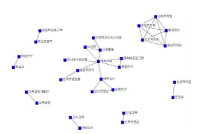
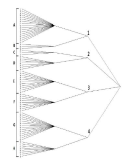

Based on the expanding concept of public value in most of areas as well as in public administration, the purpose of this study is to explore the meaning and functions of public value in sport pedagogy in Korea. For doing this, this paper has classified the concept of public value into classical and modern concepts and re-conceptualized it throughout diverse concepts implemented in several areas (e.g., social welfare, media, & culture-arts). Thus, this paper has explored the meaning of public value in sport pedagogy for analyzing the common element among the public values of sport, education, and scholarship. The public value of sport pedagogy is conceptualized as ‘the discipline that has inquired the public knowledge and also that has been served the instrumental role for making better society’. In addition, this paper has suggested the conceptual framework to extend the areas that can be applied the public value of sport pedagogy inside and outside in Kinesiology with reflection about academic and practical activity of Sport Pedagogy. Lastly, this paper has searched the multiple functions of public value in Sport Pedagogy such as educational, cultural, integrative, and global functions that could connect the academic and professional activity of Sport Pedagogy into making the public value of Sport Pedagogy.


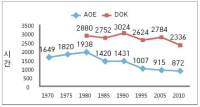
The aim of this study is to examine the directions of Physical Education Teacher Education (PETE) programs in Korea through the historical changes of each one PETE institute in England and Korea from the 1970s to 2010s based on academicisation. Document analysis and grounded theory were used to analyse historical sources and interviews. I identify four findings. First, the amounts of hours in curricula in both PETE courses have been reduced. Second, discipline knowledge in England was a first priority in the 1970s but has urgently reduced since the 1980s because of the growth and adoption of sport pedagogy. In Korea, discipline knowledge has still kept as a first priority for 40 years. However, professional knowledge in Korea has increased to enhance PETE since the middle of 2000s. Third, teaching experiences in England has increased by nearly double from 15 weeks to 32 weeks. In Korea, student have, and continue to participate in only four weeks of teaching experience. Fourth, education studies in England abolished in the 1990s. In Korea, they urgently increased in 2009. I conclude by confirming the need to study a structure and content of units of discipline knowledge and professional knowledge. I propose a system for selection of majors in the Department of Physical Education.

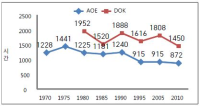
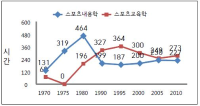
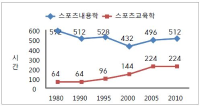
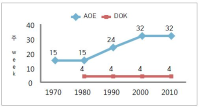
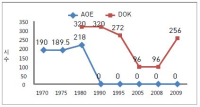
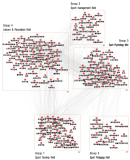
To examine the flow of knowledge structure in Korean journals of sport and social sciences over the last 10 years, this study has derived a knowledge map by conducting community analysis, one of the social network analysis methods, on Korean Journal of Sports Industry Management, Korean Journal of Sport Pedagogics, Korean Journal of Sport Sociology, Korean Journal of Sport Psychology and Korean Journal of Leisure and Recreation. According to the analysis result, the integrated knowledge map for the field of sport and social sciences was classified into 5 groups and these groups were derived to be similar to the knowledge structure of the keyword groups for the research topics of the five journals targeted by this study. Along with this result, at the same time, it has been confirmed that most of the groups shared keywords with each other. Especially, some of the keywords for the research topics of sports industry management have transferred to the research topics of leisure and recreation and those of sport sociology. Sport sociology has been revealed to be closely related to sports industry management and sport psychology. In the case of sport psychology, it has been confirmed that it is related to most of the other groups and the psychological variables for understanding human behavior can be widely used. It shows that leisure and recreation is highly related to sport psychology and sport management in terms of keywords for research topics but it is suggested that it also needs its own independent research topics. Sport pedagogics, by its nature, is an isolated field but interacts with sport psychology and attempts can be made to expand its research topics through an approach based on the concept of pedagogy for physical education.

Purpose Philosophical inquiries into physical education and sport pedagogy(PESP) have not been active until lately. A renewed interested has grown as scholars in UK and European countries have begun philosophical analysis since 2000. This study purports to review the philosophical studies in PESP during the last 50 years, and to forecast the future of SP in Korea based on its strength and weakness. Methods Literature review is adopted as the main method, as the philosophical study requires the conceptual analysis on the ideas. The past research, current main studies and future prospects are analyzed according to the three layers of the professional, the theoretical, and the personal dimensions. Results First, in the professional dimension, the philosophical inquiry by the SP philosophers and the educational inquiry by the sport philosophers are identified. Second, in the theoretical dimension, the exploration on the nature of research in PESP, the suggestions of PE models, the examination of teaching-learning in PE, the promotion of teacher/coach education and professional development, and the analysis of PE curriculum issues and policies are actively produced. Third, in the personal dimension, the practitioner research by PE teacher/professor/coach and the self-study of sport coaches have are begun to be conducted. Conclusions For the prospect of PESP in Korea, it can be said that study in the first dimension would not be bright, where as those of the second and the third would be very good for the near future.
Purpose This study conducted legal, institutional and pedagogical consideration on C0rule in Korean collegiate sport. Methods (1) Systematically examined the unconstitutional elements of C0rule in terms of the basic rights of student-athletes, and (2) reviewed pedagogical validity in terms of higher education, college credit system and physical education. Results First, C⁰rule adopted the result (the credit) of the uniform education as the standard of sanctions. Providing discriminatory educational opportunities according to academic credit is regarded as the infringement of equal rights. Second, since the college sports league is the only place to prepare for vocational education and employment for student-athletes, restricting their opportunities according to the credit is also against the freedom of happiness and choice of profession. Third, C0 credit, the minimum standard, overlooked purpose and level of higher education and rigorous evaluation. Last, C0rule has resulted in overlooking the academic significance and status of college education, especially physical education. Conclusions This study is meaningful in that it brought the subjects to discourse field and provided opportunities to review the fundamental problem of the school sport and the basic rights of student-athletes. At the present stage of the transition of the school sport system due to the introduction of various regulatory systems, we should be careful about oligopoly and unilateral flow of knowledge and production of other alienation.
Purpose The purpose of the study is to review the current trends of Korean research on sport volunteering. Methods For the research purpose, 74 KCI-listed articles published were investigated. Results The main topics of 60 articles were sport volunteering and the sub-topic or factor of the other 14 articles was sport volunteering. These articles were classified based on the publishing year, type of journal, academic area, research method, research topic, research sample, volunteer characteristics and volunteer area. Research on sport volunteering has been continuously conducted but the number of related publications has been increased since 2009. Sport volunteer research articles have been published in various sport related journals. However, the majority of the research articles are in the research areas of sport management, sport pedagogy, adopted physical education, and sport policy. Regarding the research method, more than a half of the articles were the ones using quantitative research methods, but qualitative research methods were often used as well. The majority of the research were conducted on volunteers but the research conducted on the beneficiaries of volunteer services were few. Many of the volunteers researched were college students. Event volunteering and educational volunteering were common volunteering areas in the research articles. Conclusions Korean researchers should not only conduct more research on sport volunteering with various topics but also improve the quality of the research after conducting the in-depth review of theories and literature and the better understanding about Korean situation on sport volunteering.
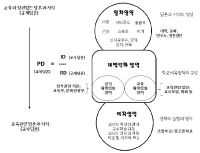
Drawing on Bernstein theory (1990, 1996) of pedagogic discourse, this study is aimed at exploring the construction of pedagogical meaning in physical education policy in Korea and providing critical implications for the development of policies for physical education and school sport. Both open-ended questionnaires (n=22) and in-depth interviews (n=9) were conducted. The collected data was commissioned by an inductive data analysis to look at patterns of regulative discourses embedded with physical education policy influencing on teachers’ educational practice. This study identified three main discourses constructing and constituting policies; sport, moral, and health. Sport discourse was the most dominant through the policy, in which two sub-discourses were central: ‘competition’ and ‘exclusion.’ Moral discourse had a strong connection with ‘crime reduction’ and ‘academic achievement.’ The structure of health discourse alleged increase in youth physical inactivity associated with sedentary living leads to an obesity epidemic. This study argued that there were significant dangers which dominant regulative discourses created a limited universe of possibilities for physical education. Therefore, we must not lose sight of the powerful discourses produced in the primary field, which have an impact on shaping forms of policy and practice in physical education. Furthermore, we need to examine in detail forms of physical education practice in order to achieve alignment in the school practice with current dominant discourses.

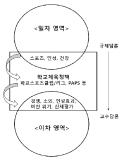
Purpose The purpose of this study is to examine the elite sport system in Germany by selecting six keyword. Methods In order to review the literature, we reviewed the reports of sports organizations such as the Ministry of the Interior, the Olympic Games of Germany, the Sports Council of Germany, and the German sports policy, history, business, programs and financial status. Conclusion In Germany, athletic associations were created in the 40s and 50s and strengthened infrastructure, projects, and workforce infrastructure by the 60s and 90s. Through its long history and tradition, Germany is at the forefront of both the Winter and Sommer Olympics. Among them, the German Olympic Sports Federation, researchers Institute, Olympic training centers, Sports School, Kader-systems and federal police·military·customs are the main keyword of elite sports. In order to support the national players in Germany, the regional Olympic training center supports sports science, sports gymnasium, sports athletic high school, sports elite school, athletes' house are operated for selection and training of excellent athletes. And all the players are in the carder system and there is a system that allows them to enter the federal police, soldiers and customs so that they can support the human resources, facilities and programs as well as train and work at the same time.